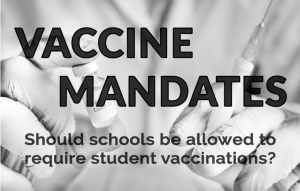CON: Lack of information
November 3, 2021
On Dec. 11, the first vaccine treating COVID-19 was approved. Now, almost a year later, only 57 percent of people in the United States are vaccinated. Now, why exactly is a vaccine that was deemed critical to public health, that was rushed and begged for by citizens only being taken advantage of by a little over half of the country’s population?
There are two answers: the first one of which relates to a lack of information. Since the vaccine was fairly new, a popular excuse for those who did not want to be vaccinated was that they weren’t sure if it was ‘safe.’
The other answer, however, lies with the people who cannot receive the vaccine due to religious or medical reasons. Some religious groups, including the Dutch Reformed Church and Church of Christ, cannot receive the vaccine because it goes against their religious practices by intervening with divination. Not to mention, people with certain medical conditions, such as those who are immunocompromised, cannot get vaccinated without putting their health at risk.
The main issue presented to this small group of individuals is the fact that schools and other workplaces are fining and punishing them for their failure to get vaccinated. According to Politico, students at Quinnipiac University must pay a fine of over two hundred dollars per week for being unimmunized to COVID-19. Similarly, students at Ohio State University and the University of Virginia must provide proof of vaccination to enroll for the school year.
While these regulations may be written with good intentions, there should be better alternatives for these individuals, such as heightening preventative measures in the form of masks and sanitation which have proven to provide safety for the public throughout the pandemic. Whatsmore is everyone can benefit from the imposition of these sanitation measures.
In regards to the actions displayed by these schools, it is unfair to those who strictly abide by the scripture, or those who are severely allergic to the contents of the vaccine, to receive punishment for being unvaccinated. Rather, those who choose to be unvaccinated without legitimate reasons should be the ones receiving repercussions As they are openly choosing to risk the health of themselves and others, because of their close-minded beliefs.
However, a major conflict arises from excusing those who are unvaccinated under religious or medical conditions as it allows those unwilling to be vaccinated to lie about their religious status or health in order to avoid the requirements.
Thus, schools and workplaces should not simply punish the unvaccinated but instead, work to determine the status of the individuals in an effective and legitimate manner. Such measures to determine the motives behind unvaccinated people include looking at medical records or having them fill out a religious questionnaire, alongside any other thorough screening processes. But ultimately, all we can do at the moment is encourage people to get vaccinated and promote safety— the number one priority.









